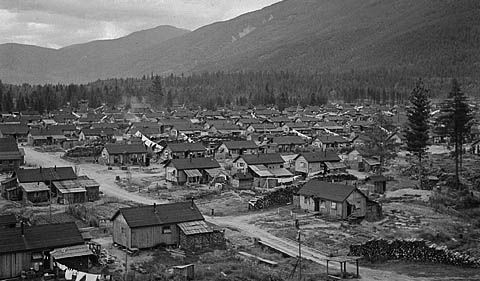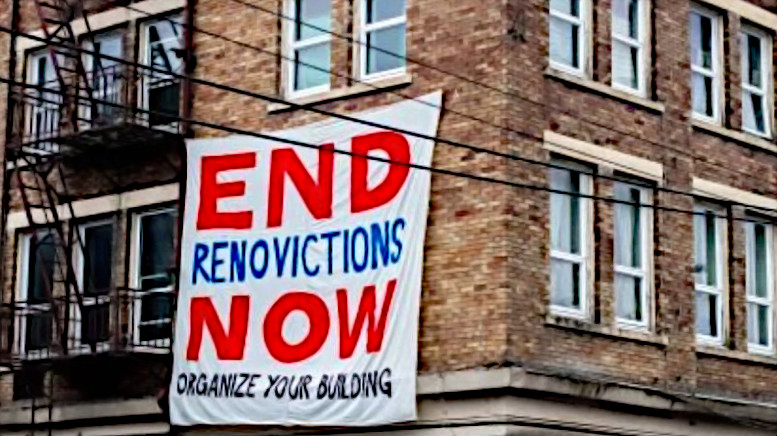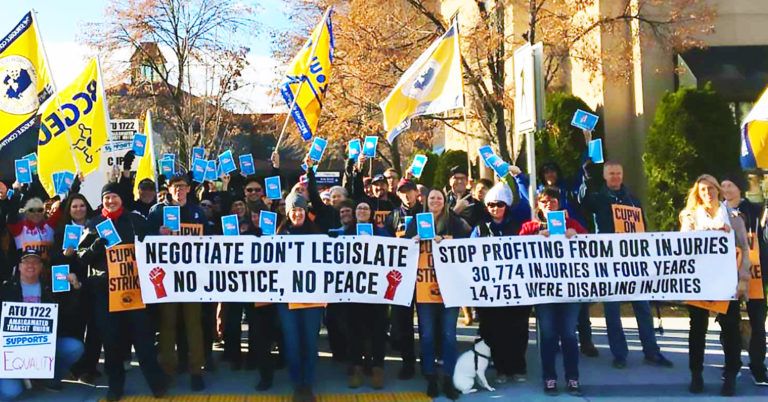Renewable Energy Needed for Jobs and Climate
BC’s NDP government enthusiastically supports the extraction and export of Liquid Natural Gas (LNG). It claims LNG is a “cleaner” alternative to coal, and burning it is part of a “transition” away from fossil fuels. The reality is that LNG is actually worse than coal for global emissions. Methane, natural gas, is a far more powerful greenhouse gas than carbon dioxide and it leaks into the air at every stage of the process from fracking the gas, along the pipelines, in the liquefaction process on board ships and at unloading.
At the same time, the BC NDP claims to have a climate plan to get to “net zero” by 2030. As Socialist Alternative has argued before, “net zero” is a totally misleading concept that relies on creative bookkeeping so that industries like LNG don’t have to account for the emissions created by actually burning the fuel, only the emissions generated during its production.
On top of the release of greenhouse gases, LNG damages the environment in many ways. It is extracted by fracking rock — injecting water filled with dangerous chemicals at high pressure to fracture the rock and release the trapped gas. This uses and contaminates large amounts of water, which has the potential to cause major health problems for communities even some distance away. The fracking increases the probability of earthquakes. Fracking has caused multiple earthquakes in north-eastern BC, even putting at risk major infrastructure including the Site C dam. Construction of pipelines, such as Coastal GasLink from Dawson Creek to Kitimat causes environmental damage including erosion and sediment build-up that endangers salmon already stressed by climate change and pollution, and poses the risk of air, soil and water pollution if there are leaks.
Why the BC NDP Supports Environmentally Destructive LNG
The BC NDP is subsidizing LNG, an industry that is more damaging for the global environment than coal, while claiming to have a responsible climate plan. Liquefying and compressing the gas, in order to ship it across the Pacific, takes an enormous amount of energy. To justify the claim that this will be “clean,” electricity will power this, rather than burning the gas which many other plants do. However, to get the power to Kitimat or other LNG terminals requires building new and expensive hydro lines, paid for BC Hydro customers – the people of BC.
The NDP’s love of LNG is no accident or a misunderstanding of the climate science. The BC NDP is trying to have their cake and eat it too by selling the benefits of LNG to workers and First Nations, while pretending to have a good climate record for their environmental supporters and youth. The reality is that any short-term gains will be more than offset by the long-term damages. It is a lose-lose: the fossil fuel industry won’t create jobs in the long term, and LNG will continue to pollute the environment.
Some First Nations Support LNG
Some First Nations are supporting these projects for their economic benefits, including the Nisga’a First Nation, and the Haisla First Nation. The term “economic reconciliation” has been used to refer to the benefits that First Nations receive for supporting LNG projects. So-called “economic reconciliation” is a perversion of the genuine idea behind Truth and Reconciliation. It creates a dilemma for many First Nations: to get economic security for their communities on the basis of capitalism, they have to sell out to the very system that has put them in this position. They must give up part of their land for exploitation by fossil fuel corporations, and in return they will get a cut of the profits.
This so-called “economic reconciliation” divides Indigenous communities. The Nisga’a plan to build a new LNG terminal at the mouth of the Nass River is opposed by other First Nations. The downstream Lax Kw’alaams Nation opposes the plan as do the Haidi, worried about the impact of a fleet of gas tankers on fishing. The Gitanyow, whose territory a new pipeline would cross, have expressed their opposition.
No one can disparage the motives of Indigenous leaders who are genuinely fighting to get some kind of relief and independence for their communities. But it must be acknowledged that this strategy cannot work in the long term, as eventually the corporations will pack their bags and go, taking any economic benefits. All that will be left is the damaged landscape and ecology.
Wet’suwet’en Land Defenders Face RCMP Violence
The Wet’suwet’en band councils (imposed on First Nations by Canada’s Indian Act) supported the Coastal Gas LNG pipeline as it provided funds for the communities’ needs. However, the traditional hereditary leadership, which acted continuously as the leadership of the whole Wet’suwet’en traditional territory since before the Indian Act, opposes the pipeline and has organized a sustained and ongoing campaign of resistance. (See this article on the difference between band councils and the traditional governance system.)
At the Unistʼotʼen Camp in Wet’suwet’en traditional territory, Land Defenders established a checkpoint on Morice West Forest Service Road, requiring visitors to receive prior consent to enter the territory. In December 2019, the BC Supreme Court granted Coastal GasLink an injunction against the Land Defenders so that CGL could build the LNG pipeline. In the process of enforcing this injunction, Land Defenders were assaulted by heavily armed RCMP officers.
While the RCMP is the federal police force, it is contracted by the BC government to provide provincial policing outside cities that have their own police. Thus, when the RCMP was used to invade Wet’suwet’en territory, it was an act of state violence on behalf of the BC NDP government. The RCMP created a specialized force, the Critical Response Unit (CRU-BC), to enforce the interests of oil and gas companies in BC. Support for LNG makes a mockery of the NDP’s commitment to the UN Declaration on the Rights of Indigenous Peoples that it passed into law in 2019.
Opposition to the Coastal GasLink pipeline, combined with horror at the state violence used against Land Defenders, precipitated solidarity protests across Canada. Activists have also targeted RBC Bank, the biggest funder of Coastal GasLink and, in fact, the largest funder of fossil fuel projects in the world in 2022. Protests and Days of Action against RBC have continued, some of which Socialist Alternative members participated in and helped to organize.
LNG Provides Few Jobs?
Socialist Alternative stands firmly on the side of all workers who demand good jobs and good pay so that they can afford a decent life for themselves and their families. While LNG may provide jobs today, the overall number of jobs in the fossil fuel sector in Canada has been declining, even as billions of dollars of taxpayer money has been used to try to prop it up. Fossil fuel workers and their unions should take a long-term view.
There is huge economic potential in renewable energy. A massive expansion of renewable energy, upgrading homes and buildings, and mass transit on the scale needed to transform our whole economy could create millions of jobs over decades. The Coastal GasLink pipeline and the liquefying plant at Kitimat is projected to cost $48.3 billion. All that money will provide only around 400 permanent jobs — $12 million for every job! That same $48 billion and the government subsidies would be much better used in providing good jobs that contribute to the transition to clean energy.
Major Political Parties in the Pocket of Fossil Fuel Industry
Sadly, the BC NDP is running cover for the fossil fuel industry and repeating the lie that the only way to prosperity for working people and First Nations is to submit to their demands. At the same time, the BC NDP tells their environmentalist supporters that LNG is part of the transition to renewable energy, a transition that never seems to actually happen. It is manipulative rhetoric that serves to confuse and demoralize the working class and Indigenous people, especially youth, who are genuinely terrified for the future of the planet. Different organizations, including Socialist Alternative, have joined campaigns like Frack Free BC, to expose the real danger that this industry presents.
Not surprisingly, none of the other major provincial parties offer any alternative. BC United, when it was called the BC Liberals, had fantasy dreams about LNG. Its 2013 election manifesto stated that LNG would mean “75,000 full time jobs created once in operation [and] create $1 trillion in economic activity and create the BC Prosperity Fund with $100 billion over 30 years.”
Now both BC United and BC Conservatives focus on their plan to scrap the carbon tax. Socialist Alternative is opposed to the carbon tax because it is ineffective and does not put the burden on the highly profitable corporations that are responsible for the vast majority of carbon emissions. But BC United and the BC Conservatives only want to scrap the carbon tax in order to protect the profits of big business, they don’t care about the working class. In government they would be even worse than the BC NDP.
The BC Green Party is opposed to LNG, but sadly they are not a party for the working class: they threatened to bring down the minority BC NDP government over its plan to improve rights for workers trying to join a union (the majority NDP went ahead and brought in card check legislation that has now made it much easier for workers to unionize).
The BC NDP had a tradition of being the party of organized labour, but decades of misleadership have drawn it far off course from the interests of the working class. Too often today the NDP listens to smooth-talking fossil fuel lobbyists and other corporate voices. The needs of the working class and big business are in opposition to each other. A political party cannot serve both.
A better world is possible, but to get it the working class needs organization and political leadership that refuses to bend to big business, and instead stands up for the working class and the environment. This means active socialist organizing alongside campaigning unions. Socialist Alternative works to build this power and to replace capitalism with a socialist society.




